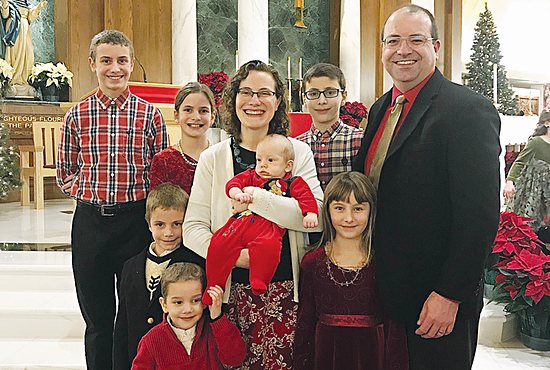
When “Grandma Betty” died more than a year ago, John and Heidi Flanagan did their best to answer the questions of their three children age 6 and younger and prepare them for their beloved family friend’s funeral.
Because concepts of heaven and death frequently come up in family conversations about faith, it was easier for the Flanagans, who have seven children and belong to St. Joseph in West St. Paul, to explain death when their kids encountered it for the first time.
“It wasn’t scary for them; we took our time; we approached the casket as a family,” said Heidi, 44. “We were holding onto our little ones. We had a lot of time to kneel in front of her casket and pray.”
From talking with their children about complex ideas of how the body stops working while the soul goes to God and how we hope heaven will be our eternal home, the Flanagans have found ways of explaining death that build on dinner table conversations about the saints and other topics.
“The more we can tangibly, from a young age, show that death is a normal part of life, it takes the fear and the scariness out of it,” Heidi said.
Even if children already have some understanding of spiritual concepts, they likely will have questions and even fears when they first encounter death. Several Catholic parents and therapists shared advice for how parents can console their children and prepare for their questions with responses grounded in faith.
Three fears children have about death are that their parents will die and leave them alone, that they will die unexpectedly, and that death will hurt, said Therese McCann, a licensed psychologist based in St. Paul.
“Sometimes it does hurt, but God is there to help — he never gives us more than we can bear,” she said.
Like all their thoughts and feelings, parents should acknowledge and validate children’s fear of dying, said Anne Kunesh Carney, a licensed marriage and family therapist at MidWest Center for Personal & Family Development in St. Paul.
The fact that God the Father experienced the death of his son, Jesus, as did Mother Mary, may comfort them, said Kunesh Carney, a parishioner at Holy Trinity in South St. Paul.
Parents can encourage children to trust God by explaining that he decides when people die — and we don’t know when — but that he’ll always take care of us, said McCann, who also belongs to St. Joseph in West St. Paul. Heaven, she said, is where God is, as well as those who have died who love and choose God.
The death of an animal or plant can help young children understand when a body is no longer living, said Kunesh Carney, who also recommends explaining how the births of babies and peoples’ deaths are part of the natural life cycle.
To teach children about creation and immortality, Kunesh Carney suggested drawing a line with an arrow on both ends representing God, who has neither beginning nor end. An arrow extending out of a point shows that humans were created but have eternal souls. A third line with a point at each end represents animals that were created but lack souls.
Kendra Tierney, a Los Angeles-area blogger who writes Catholic All Year, prepared her (then seven) children of all ages for a relative’s funeral in 2014 by telling them how the soul animates the body and what happens when it leaves at death.
“I’m pretty sure my kids weren’t uncomfortable with it because we weren’t uncomfortable with it,” she wrote shortly after the funeral.
Parents can explain that while children won’t see the loved one again during their lives, they can pray for them and ask the loved one to pray, Kunesh Carney said.
Parents can help their children process grief by showing and identifying their own emotions while also assuring them that God is comforting their parents, she said.
Tierney and her husband didn’t shelter their children from family members’ grief at the funeral. “Watching other people process grief will help my kids understand how to process it for themselves,” she wrote.
And taking them to a wake or funeral can teach them to comfort others, Tierney wrote.
Closure may take time, but kids can learn that life will still be good after loss because God will be there, Kunesh Carney said.
“When everything in life can change and we’ll be sad, when something bad happens or a loss we can’t control, what we do know is that God is the constant, and he will be there,” she said. “He doesn’t promise that there won’t be death and that we won’t be sad or suffer, but he promises that he’ll be with us.”



